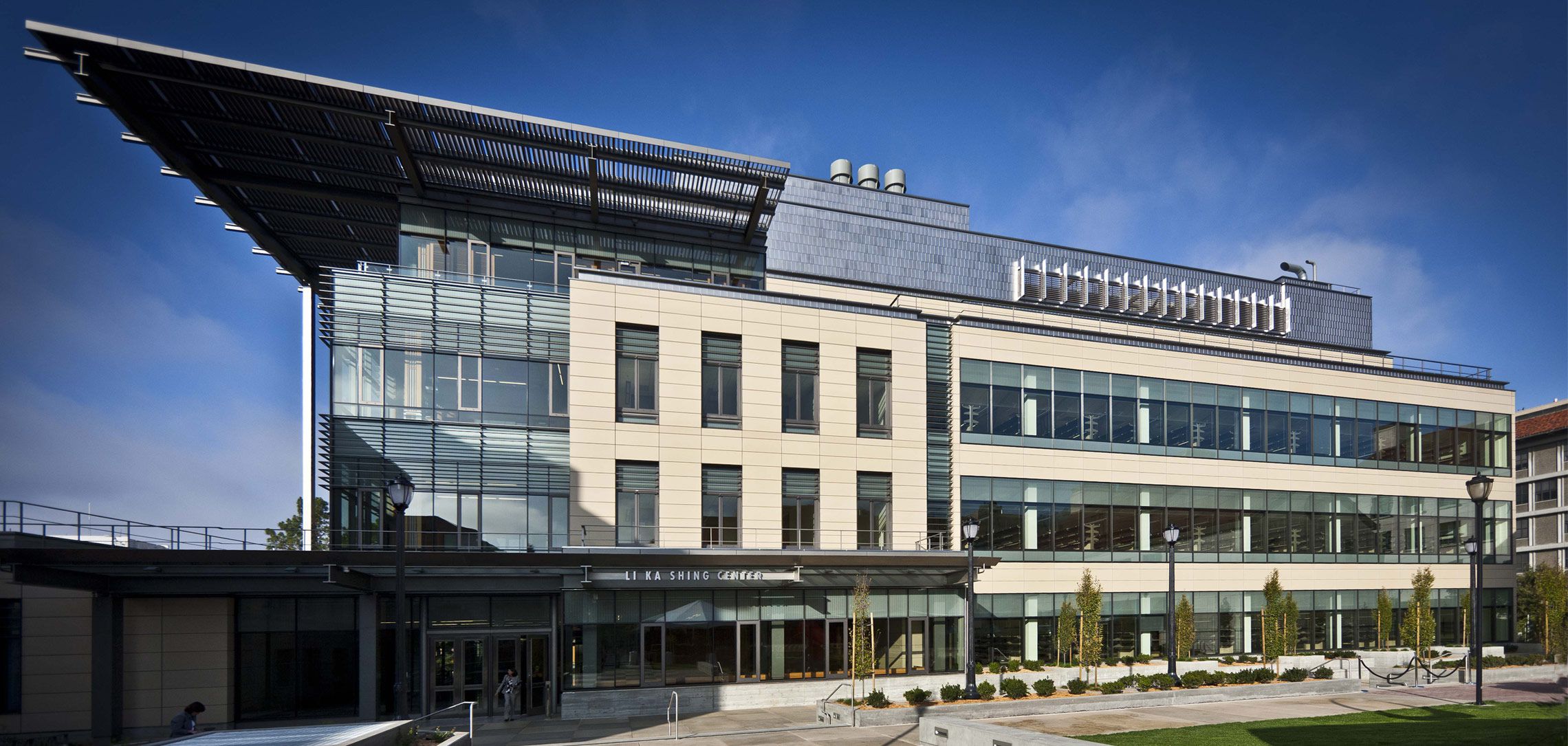
Innovative Genomics Initiative Officially Launches Today
The Innovative Genomics Initiative (IGI) officially launches today, charting a fast course for gene editing breakthroughs that will unleash academic, clinical and industry research to guide and catalyze the potential of a revolutionary new genome editing technology.
Bay Area to Serve as Global Hub for CRISPR-Cas9 Technology
Biotechnology, global health and pharmaceutical executives will meet today for a briefing about the extraordinary impact of the CRISPR-Cas9 gene editing technology at the official opening of the Innovative Genomics Initiative (IGI).
Housed at the Li Ka Shing Center for Biomedical and Health Sciences at the University of California, Berkeley, and at UC San Francisco (UCSF), the IGI is a bold new globally focused initiative committed to advancing our understanding of the ways in which genomic information can be harnessed. IGI will lead research collaborations and public discourse on CRISPR-Cas9 technology and bring about fundamental change in biological and biomedical research by enabling scientists to read and edit genomes with equal ease.
Invented at UC Berkeley by Breakthrough Prize-winning scientist Dr. Jennifer Doudna, professor of molecular and cellular biology and a Howard Hughes Medical Institute investigator, CRISPR-Cas9 enables scientists to program a commonly found enzyme to target specific regions of DNA and delete or modify genes. Scientists are already applying CRISPR-Cas9 to understand and explore new treatments for diabetes, HIV/AIDS, blood cancers and rare genetic diseases like Huntington’s.
A joint venture between UC Berkeley and UCSF, the IGI taps into the Bay Area’s position as a global hub of scientific and clinical research and innovation in business, technology and investment.
“The Bay Area offers a unique combination of world-leading academic research facilities and clinical institutions with a vibrant and innovative biotech sector,” said Doudna, IGI co-founder. “There is no better place in the world to spark innovation and discovery in the field of genomics.”
Dr. Jonathan Weissman, co-founder of IGI, UCSF professor of cellular and molecular pharmacology, and Howard Hughes Medical Institute investigator, said, “The potential of CRISPR-Cas9 to identify novel treatments for vexing medical problems is extraordinary. I’m pleased that UCSF will be among the first medical research facilities to use it.”
New Collaborative Model Combines Best of Basic Research, Clinical Research & Business
“Professor Jennifer Doudna’s groundbreaking scientific work, and her launch of the Innovative Genomics Initiative are emblematic of all that we strive for in our research endeavors at Berkeley,” said Chancellor Nicholas Dirks. “With its enormous potential to dramatically improve the health and well-being of people around the world, the IGI is another wonderful example of how this university’s research enterprise contributes to the greater good.”
The First Medical Research Collaboration: Severe Combined Immunodeficiency
At UCSF, Dr. Jennifer Puck, medical director of the UCSF Clinical and Translational Science Institute’s Pediatric Clinical Research Center, is applying CRISPR-Cas9 technology in her effort to treat severe combined immunodeficiency (SCID), often called the “Bubble Boy” disease. Dr. Puck’s work has focused on the genetic cause of SCID and the development of gene-targeted therapies for SCID.
AstraZeneca First of Many Pharma & Biotech Partners to Come
On the industry side, IGI has announced a research collaboration with AstraZeneca focused on CRISPR-Cas9. The IGI and AstraZeneca will work closely together to identify and validate gene targets relevant to cancer; cardiovascular, metabolic, respiratory, autoimmune and inflammatory diseases; and regenerative medicine to understand their precise roles in these conditions.
“We are excited to pair the IGI’s premier expertise in CRISPR-Cas9 gene editing and regulation with AstraZeneca’s deep experience in therapeutics,” said Dr. Jacob Corn, scientific director of the IGI. “I’m confident that, working side-by-side with scientists at AstraZeneca, our collaboration will positively impact drug discovery and development to hasten treatments to patients.”
The partnership with AstraZeneca demonstrates IGI’s commitment to breaking down the barriers between academic and corporate research, while respecting the unique value that each bring to the work. Such innovative collaborations will accelerate the development of CRISPR-driven therapies.
Building the Academic Field for CRISPR-Cas9
IGI will also host bioethics conversations and lead opportunities to collaborate. In summer of 2015, IGI will host a CRISPR Workshop: Routes to Designer Biology featuring small group sessions with scientists, guest lecturers, students and IGI staff, and will foster interactions based around the cutting- edge research of CRISPR-Cas9.
**********
ABOUT THE IGI: The Innovative Genomics Initiative (IGI) was established in early 2014 at the Li Ka Shing Center for Genomic Engineering at the University of California, Berkeley, and is dedicated to the enhancement and proliferation of genome editing research and technology in both the academic and commercial research communities.
ABOUT UC BERKELEY: The University of California, Berkeley, is the world’s premier public university with a mission to excel in teaching, research and public service. This mission has led to the university’s distinguished record of world-class scholarship, innovation, concern for the betterment of our world, and top rankings for its schools and departments. UC Berkeley is the flagship of the 10-campus University of California system, originally chartered in 1868. Enrolling more than 36,000 undergraduate and graduate students, the campus has more than 1,500 full-time and 500 part-time faculty members in more than 130 academic departments and more than 80 interdisciplinary research units. Twenty-two Nobel Prizes have been awarded to faculty, and 29 Nobels to alumni.
ABOUT UCSF: UCSF is the nation’s leading university exclusively focused on health. Now celebrating the 150th anniversary of its founding as a medical college, UCSF is dedicated to transforming health worldwide through advanced biomedical research, graduate-level education in the life sciences and health professions, and excellence in patient care. It includes top-ranked graduate schools of dentistry, medicine, nursing and pharmacy; a graduate division with world-renowned programs in the biological sciences, a preeminent biomedical research enterprise and top-tier hospitals, UCSF Medical Center and UCSF Benioff Children’s Hospitals. Please visit www.ucsf.edu.
Contacts
- UC Berkeley: Robert Sanders, rlsanders@berkeley.edu, 510-643-6998
- UCSF: Pete Farley, peter.farley@ucsf.edu, 415-502-4608
You may also be interested in

IGI Seminar Series: Progress and Challenges in Delivering Cassava with RNAi-mediated Resistance to Cassava Brown Streak Disease to Smallholder Farmers in Africa – It’s Not Just About the Technology

IGI Seminar Series: Empowering Teachers, Transforming Classrooms: Advancing K-12 STEM Education

IGI Seminar Series: Writing DNA with RNA: Genome Engineering by Target-Primed Reverse Transcription
